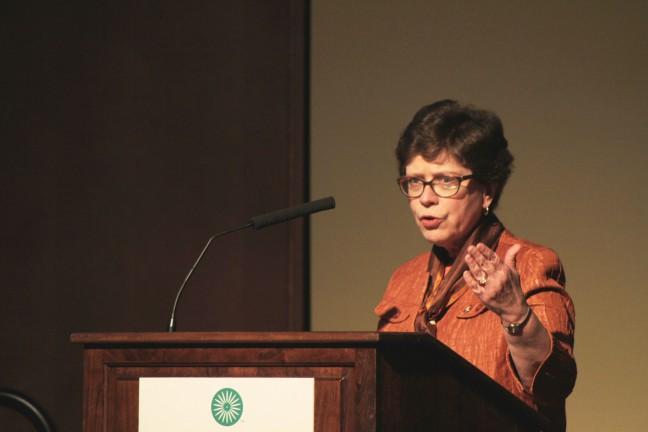In the aftermath of Gov. Scott Walker’s budget address, University of Wisconsin Chancellor Rebecca Blank spoke to the Board of Regents Thursday, saying Walker’s proposed cuts are “just too big.”
After Walker proposed a $300 million cut to the UW System and called for an extension of the tuition freeze in his biennial budget address, Blank continued to express concern about UW’s future in retaining faculty and maintaining excellence.
State general purpose revenue dollars have been steadily declining over the last ten years. Tuition revenue has crept up, which has not been enough to offset the difference. In 2016, there will be the largest decline of state dollars in UW’s history, Blank said.
To fill this, Blank said UW must look at federal funding. The problem is, federal funding has not been rising, she said. While Blank is doing some private fundraising, she said gift dollars do not replace state or federal dollars.
With budget cuts, tuition is generally the first to rise, as it quickly increases growth. But with Walker’s plan to extend the current systemwide tuition freeze through 2017, Blank said UW’s position in the middle of the Big 10 in terms of tuition will likely fall to the bottom.
For non-resident undergraduate tuition, UW is near the bottom, ahead of Ohio State, Nebraska and Minnesota. Blank said she wants to raise out-of-state tuition higher.
“I would argue, for Madison, in this market, we shouldn’t be at the median,” Blank said. “We should be up in the top third of these schools, because we are one of the best educational quality schools and high reputation schools among this list.”
Due to the budget cut, Blank said UW has a $91 million “hole to fill.” To put it in perspective, if UW were to cut the business, law, nursing, pharmacy and veterinary medicine schools, it still would not make up for the $91 million hole, she said.
Blank said the proposed cuts imply unfilled faculty slots, reduction in student programming such as advising and internships, reduced financial aid and staff layoffs.
Blank said UW has some challenges to face moving forward and that it must make efforts to retain faculty.
“At the end of the day, the reputation of the university is the reputation of its researchers and its faculty,” Blank said. “If you don’t have faculty, you are not going to have staff to hire and you are not going to have students.”
In comparison to other Big 10 institutions, UW professors’ salaries are 12 percent below their peers. The average median salary offer from a competitor in 2013-14 was 42 percent higher than UW salaries. Blank said while UW had a good year in regards to retaining staff, with 156 successful retention efforts out of 170, the university cannot get complacent.
Blank also highlighted the shifting educational demands in science, technology, engineering and mathematics fields. In the last 14 years, the undergraduate students who have declared majors in STEM fields has risen from 32 to 44 percent. Blank said UW needs to keep up with that demand by hiring more faculty, getting more instructional space and providing academic advisors.
To help this, Blank said renovating the chemistry building should be a top priority. She said she does not expect it to be included in the next budget, but said she will fight her hardest to get it included. The expansion would provide larger labs and allow for larger freshman and sophomore classes.
While working to fix the budget hole, Blank said she wants to build on UW’s legacy of service to the state and the nation and to do even more to preserve higher education for people across the state.
“These cuts are too large, they are too large for our university and they are too large for the state,” Blank said.
Blank will further address the budget cuts in campus forums next week.


